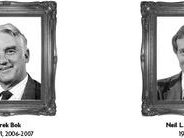
University President Drew G. Faust has adapted the goal of creating "One University" from her predecessor Lawrence H. Summers and, to a lesser extent, former President Neil L. Rudenstine, who oversaw Harvard's first University-wide capital campaign.
The financial crisis, a cheating scandal, an encampment of protesters in Harvard Yard—events have shaped the presidency of Drew G. Faust.
“Happily we haven’t had a Civil War, you know,” Faust said, referencing the defining event of Abraham Lincoln’s presidency.
A subject of Faust’s historical scholarship, Lincoln famously described his presidency as a response to circumstance. “I claim not to have controlled events, but confess plainly that events have controlled me,” he said.
Referencing that remark, Faust said she saw similarities between her presidency and the turbulent times it has seen and Lincoln’s time in office.
“I think that’s an important part of being president from 2007 to...2013,” she said. “Events have had a big role.”
In many ways, Faust was the perfect candidate to face the difficult events of her tenure thus far. A consummate listener and observer, Faust addressed the ideas and concerns of her predecessors and colleagues, responding in a way that has carried her through the storm.
“It’s not me coming in and announcing some set of ‘Drew Faust’ ideas plucked from out of the sky,” Faust said. “It’s rather trying to translate everything I’m hearing into a program that reflects the insights of people in the community.”
But by continuing her predecessors’ missions, her input-driven leadership style has made her vision—including the central concept of ”One University”—an amalgamation of the feedback of Harvard community members and the ideas of her predecessors.
While her style has worked during tumultuous times for both the University and the world, it remains to be seen whether she can use her renowned communication skills to renew and refine inherited ideas and lead Harvard through an ambitious, 21st-century capital campaign.
VISION WITHOUT VOLATILITY
When former University President Lawrence H. Summers resigned from his post in 2006 under pressure from members of the Faculty of Arts and Sciences, marking the shortest tenure of a Harvard president since the United States Civil War, Harvard’s central administration faced a community still reeling from the controversy surrounding Summers’s presidency.
Looking for a safe choice who could pull together the various interests within the faculty while also continuing many of Summers’ landmark endeavors, the University’s governing bodies picked the dean of a little-known Harvard research institute.
Faust, then-Dean of the Radcliffe Institute for Advanced Study, was celebrated for her ability to forge connections between faculty members and cater to their needs—a skill that eluded Summers.
Director of the Mahindra Humanities Center Homi K. Bhabha, who served as a senior advisor in the humanities at Radcliffe, said that Faust’s communication skills enabled her to facilitate partnerships between scholars in different fields.
“The reason why she was able to transform Radcliffe Institute was the fact that she was a very good listener to the constituencies that formed Radcliffe,” Bhabha said of Faust’s role in crafting the Institute’s programs.
Read more in University News
Canada Tells HKS It Is Time To Pass the Baton













